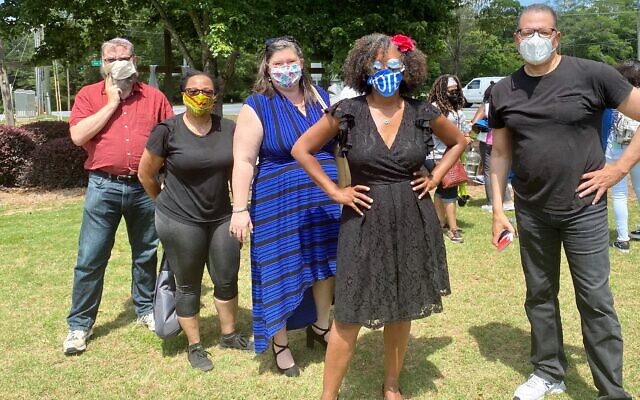It Is Time
Black Jewish diversity-inclusion activist shares her views on the Atlanta protests.

We carried the chains in Egypt and our necks held the shackles in Africa before our long journey over the rough seas. Our lands were looted, our belongings stolen, and our sacred spaces were burned.
We toiled in the fields and labored to build this country you call great. For centuries we have worked, we have fought, we have bled, we have suffered, and we have died.
We are tired.
The time has come. The time has come when we say, “enough is enough.” The time has come when we stand up and shout “never again.”
The time has come when we know we will never forget. We will say the names of the people who were murdered by law enforcement, and we will remember.
The time has come. The blood we shed that created the soil of the earth and fed the roots of the tree has grown to be a solid trunk with sprouting branches that now blooms. The blood to eat, the blood to vote, the blood to learn, the blood to be humanized, the blood to be who we are, and the blood to live. The time has come when we no longer shed our blood. The time has come when we stand together and with our allies as one human race and recognize we all bleed the same color blood.
The time has come when we fight.
We fight for justice, equity, humanity and liberation. We fight for love.
The time has come to unpry the crippling fingers from around our necks and push the boot off of our chests, … so we can breathe.
The time has come for a revolution.
A revolution to value the lives of black/brown people and for the world to know our power and that we matter. Black lives matter is not just a hashtag; it is a movement to ensure justice, equity and liberation. The time has come where all people stand together as one humanity to fight to end the structural oppressions, injustices and modern-day issues that negatively impact the livelihood of black/brown people.
The time has come for systemic police reform. We want to end the militarization and brutality that black/brown people experience from police. We want police that stop the excessive use of force that disproportionately impacts black lives. We want to stop the implicit biases, racism and anti-blackness that result in targeting, disrespectful interactions and unequal sentencing of black people.
We want to end qualified immunity. If there is an incident when a law enforcement person murders or uses excessive force, we want them to be convicted like a civilian would in the same scenario. If civil rights are violated, we want the ability to sue to get justice.
We want a Georgia hate crimes bill that is included with comprehensive criminal punishment reform. We do not want this bill to disproportionately impact black people, for this reason criminal reform, ending mandatory minimum sentencing, stopping cash bail, and investing in education (instead of prisons) are all important.
A Georgia hate crimes bill may discourage people from committing acts of violence against another person because of their race, color, gender, disability, sexual orientation, gender identity or expression, nationality or ethnicity.
We want to end citizen’s arrest, stand your ground and open carry laws that may encourage terrorism and murder of black people.
The time has come to divest from police, jails and prisons, and invest in education. We must end the school-to-prison pipeline by investing in early literacy; arts; tutoring; after- school programming; social-emotional programs; constructive discipline policies; implicit bias training; diversity representation; and culturally relevant curriculums. Instead of school resource officers, we need more counselors, social workers and paraprofessionals. We need to reduce class sizes, improve the school environment and engage the rich diversity of our communities. We need school leaders who reflect the demographic, have lived experiences, are empathetic, and work to meet the needs of the community.
The time has come to remove confederate names and symbols. We must demolish the representations of a history of terror and racism. The statues, street and school names and monuments must be replaced with symbols of unity, hope and peace.
The time has come to stop making empty promises and statements of solidarity without anti-racism systems. Many organizations are homogenous and because they do not reflect diversity in their leadership, they uphold structural racism. The time has come to actually abolish structural racism in our Jewish and non-Jewish organizations. We must engage BlPOC [black, indigenous and or/people of color] leadership in institutions, establish affirmative actions for black people and end the capitalistic greed over humanity. We must invest in the people to close the wealth gap that keep black/brown communities.
The time has come when all injustices must be reconciled, and reparations made to descendants of chattel slavery.
The time has come for change. We need change now and we are joining together all around the world in solidarity against systemic racism. Black people have grieved for centuries, the systemic racism before COVID-19, the disproportionate deaths due to racism during this epidemic, and the perpetuation of injustices during this health pandemic is too much.
Enough is enough. We want strategic and sustainable actions to abolish systemic racism now. The time has come for change. The time is NOW.

Tarece Johnson is founder of the Global Purpose Approach, which promotes understanding, appreciation and respect for diversity, inclusion, equity and social/economic/education justice.



comments